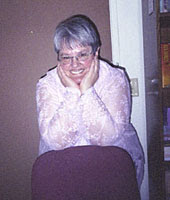About the book:
A new identity
may protect her family—but can it protect her heart?
After the loss of her husband and the birth of her baby,
Charlotte has had a long, hard year. But she can find no rest from the ghosts
of the past and flees to Cheyenne to put the pieces of her life back together.
Wealthy cattle baron and political hopeful Barrett Landry must
make a sensible match if he is to be elected senator of the soon-to-be state of
Wyoming. He needs someone with connections. Someone without a past. Yet he can’t
shake the feeling that Charlotte holds the key to his heart and his future.
Will Charlotte and Barrett find
the courage to look love in the face? Or will their fears blot out any chance
for happiness?
And now, behind the book:
“Write what you know.”
I don’t think there’s a writer alive who hasn’t heard that advice. It’s good advice – no doubt about that – but
it isn’t the answer for every writer or every book. Sometimes it’s important to go beyond your
comfort zone and write about what you don’t know. That’s what I did in Waiting for Spring.
I’ve always been intrigued by family dynamics, which is one
of the reasons the heroines of the three Westward Winds books are sisters. Each of them, because of her birth order and
her individual personality, views the world differently. Abigail, the heroine of Summer of Promise, and With
Autumn’s Return’s Elizabeth were
relatively easy to write, since they’re single professional women.
Even though I’ve been married for many years,
I could identify with them. Charlotte was
a different story. As Waiting for Spring begins, Charlotte is
a young widow with a child. I’ve never
been widowed, and I have no children. So
why on earth did I choose to write about Charlotte? The answer is simple: I wanted to know what
her life was like. I was writing not
about something that I knew, but about something that intrigued me, something I
wanted to learn more about.
I started asking myself questions and then searching for
answers. We all know that some women have
the strong maternal instincts we associate with mama grizzlies, while others
neglect or even abuse their children.
Why are they so different? And
what makes a good mother? I had to
create my own definition before I could proceed.
You won’t be surprised that Charlotte is one of the good
mothers, the ones who’d do anything to protect their children. If I left her at that, the story wouldn’t be
interesting, and I wouldn’t have learned too much. So, I complicated the situation. Not only did I make Charlotte a single
mother, but I made her the single mother of a special needs child in an era
when those children were routinely sent to live in an asylum.
I considered a number of different disabilities and did a
lot of research (much of it heart-wrenching, I might add) into mental
disabilities before I finally decided that Charlotte’s son David would be
blind. One of the reasons I ultimately
chose blindness was that I knew something about it. Yes, I was listening to those mentors who
told me to write what I knew, although I was still stepping out of my comfort
zone.
My maternal grandmother, whose glaucoma resulted in blindness
when she was in her seventies, lived with my family for four years when I was a
child. Seeing how Grandma reacted to her
changed circumstances made an indelible impression on me, but of course life
would have been very different for David, who was blind from birth. More research was required. I needed to learn how quickly blind children
progressed, how their childhood milestones varied from children who were not
visually impaired. I needed to learn how
blind children would have been taught in the late nineteenth century. And, most of all, I needed to put myself into
Charlotte’s shoes, feeling the pain that mingled with her love for her son.
Poor Charlotte. Her
life wasn’t easy. As if being widowed
and dealing with David’s blindness weren’t bad enough, she’s being pursued by
an evil man, one who’ll do anything – even harming her son – to find the money
he believes she has. How will she keep
David safe at the same time that she supports them both?
I had to delve deep inside myself to learn the answers to
those questions. There were times when I
shuddered, other times when I cried, and still others when I laughed as I created
Charlotte and her life. The process
wasn’t always easy, but the result was that I see the world – and ‘see’ is a
deliberate word choice – differently than I did before I wrote Waiting for Spring.
So I say to those writers who are reading this, consider
writing about what you don’t know. The
rewards may surprise you.
Amen, Amanda! As a writer of historical fiction who has never lived on a farm, I often say, "write what you would like to know about, because you can always research."








2 comments:
Eeek! I didn't know another book was out! Yay!!! LOVE Amanda Cabot! :D
Linnette -- Your comment made me smile. Thanks! I'm delighted that you enjoy my books.
Post a Comment